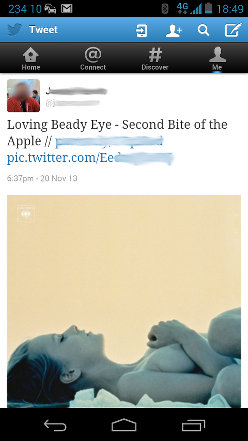The Danger Of Auto Displaying Pictures On Twitter
The UK has the notion of a "strict liability" law. If you are caught with a picture of child abuse - you're guilty of a crime. It doesn't matter if it was sent to you unsolicited, or misaddressed. Possession is the crime and there are no mitigating circumstances.
On that cheery note, let's consider Twitter's new image embedding functionality. If your friends post a photo onto Twitter, you will see it in your timeline automatically. No need to click on anything. (As an aside, that's a feature Dabr and other Twitter apps have had for years).
A few years ago, the Twitter account of Britney Spears was compromised. Attackers were able to send an email to her TwitPic account which contained a fake notice of her death.
Imagine, for a moment, if it had contained a pornographic photo. Everyone who followed Britney would automatically be exposed to explicit images. An annoyance for some, an employment disciplinary matter for others - and for some, a legal issue.
Suppose a some hacker takes over the account of a well followed Twitter user. They then upload images which are illegal in the UK - and possibly other countries. Now, everyone who follows them, has that image in their web browser. It's stored in their cache, it may even have been auto downloaded onto their phone.
That's what happened to me last week.
 A friend posted a photo of the new Beady Eye single.
A friend posted a photo of the new Beady Eye single.
True, it's not the most explicit image in the world, but it's not the sort of thing you want on your screen at work. Nor do you want it in your browser's cache should someone decide you need investigating.
All of a sudden, all of this user's followers have an (unwanted?) image on their computer. In this case, half a breast is unlikely to cause much offence - but this could easily have been the controversial Virgin Killer album cover.
This thrusting of potentially illegal images can also happen by accident - a Twitpic error caused the BBC's technology correspondent to appear to share a photo of a woman "in a pose that can only be described as extremely post-watershed."
So, what does this mean for Twitter and for strict liability laws? It's almost impossible for a computer to automatically detect whether an image is offensive or illegal. Humans aren't much better - and there's a massive cost for pre-emptive moderation.
A wave of spam on social media could be enough to see you convicted on some very nasty charges.
Neil says:
In particular, there are defences available for the possession of an indecent image of a child, and most of them are within 160(2), Criminal Justice Act 1988 — these include unsolicited receipt, if deleted promptly:
"(1) Subject to section 160A, it is an offence for a person to have any indecent photograph or pseudo-photograph of a child ... in his possession.
(2) Where a person is charged with an offence under subsection (1) above, it shall be a defence for him to prove—
(a) that he had a legitimate reason for having the photograph or pseudo-photograph in his possession; or
(b) that he had not himself seen the photograph or pseudo-photograph and did not know, nor had any cause to suspect, it to be indecent; or
(c) that the photograph or pseudo-photograph was sent to him without any prior request made by him or on his behalf and that he did not keep it for an unreasonable time."
http://www.legislation.gov.uk/ukpga/1988/33/section/160
Unless you had a different piece of legislation in mind?
Neil says:
Neil says: